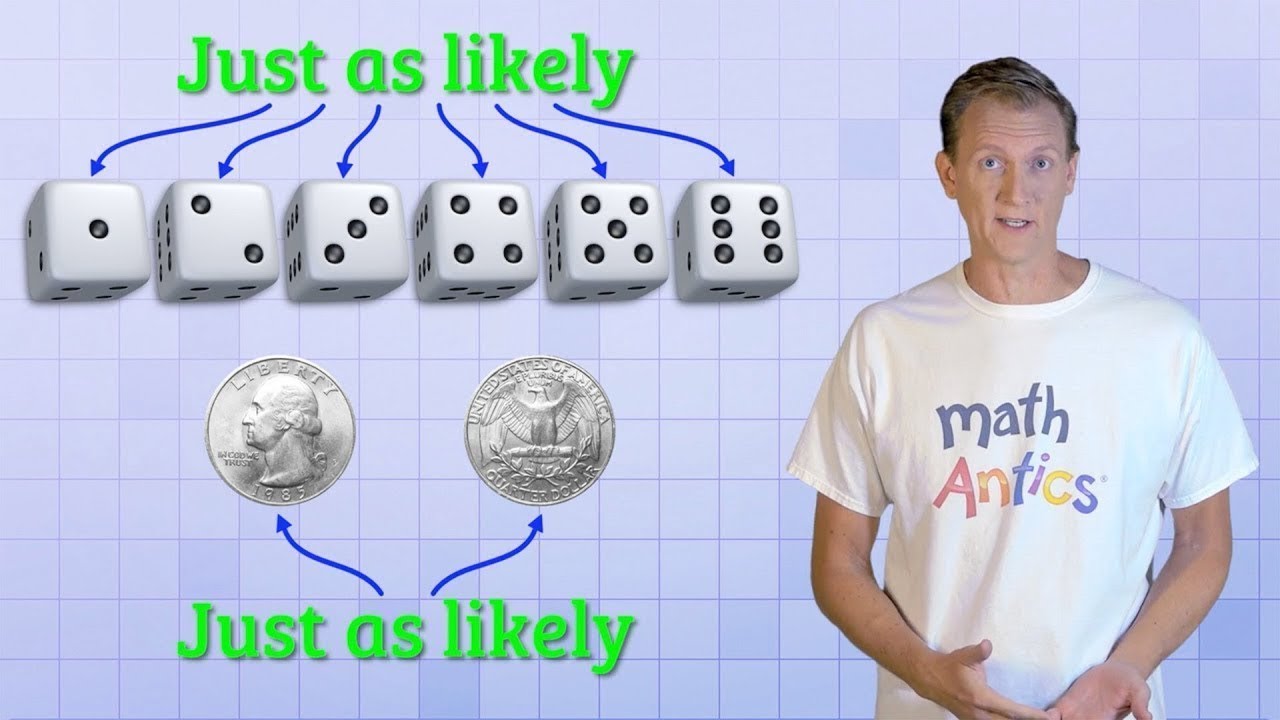
Understanding Probability
Interactive Video
•
Mathematics
•
6th - 10th Grade
•
Practice Problem
•
Easy
Standards-aligned

Wayground Content
Used 6+ times
FREE Resource
Enhance your content in a minute
10 questions
Show all answers
1.
MULTIPLE CHOICE QUESTION
30 sec • 1 pt
What is the probability of flipping heads with a fair coin?
1/4
1/2
1/3
3/4
Tags
CCSS.7.SP.C.7A
2.
MULTIPLE CHOICE QUESTION
30 sec • 1 pt
What does a probability of 1 indicate?
The event is impossible
The event is unlikely
The event is certain to happen
The event has a 50% chance of happening
Tags
CCSS.7.SP.C.5
3.
MULTIPLE CHOICE QUESTION
30 sec • 1 pt
What does a probability less than one-half indicate?
The event is impossible
The event is certain
The event is likely
The event is unlikely
Tags
CCSS.7.SP.C.5
4.
MULTIPLE CHOICE QUESTION
30 sec • 1 pt
How is probability commonly expressed besides fractions?
Exponents
Square roots
Integers
Decimals and percentages
Tags
CCSS.7.SP.C.5
5.
MULTIPLE CHOICE QUESTION
30 sec • 1 pt
What is the probability of rolling a 3 on a standard die?
1/3
1/2
1/4
1/6
Tags
CCSS.7.SP.C.7A
6.
MULTIPLE CHOICE QUESTION
30 sec • 1 pt
Why might results from a small number of trials not match expected probabilities?
All trials are biased
Due to calculation errors
Randomness leads to unpredictable short-term results
Because of the law of averages
7.
MULTIPLE CHOICE QUESTION
30 sec • 1 pt
How can you increase the accuracy of experimental probability results?
By guessing the outcomes
By changing the probability
By conducting fewer trials
By conducting more trials
Access all questions and much more by creating a free account
Create resources
Host any resource
Get auto-graded reports

Continue with Google

Continue with Email

Continue with Classlink

Continue with Clever
or continue with

Microsoft
%20(1).png)
Apple
Others
Already have an account?
Similar Resources on Wayground

10 questions
Recordando el cálculo.
Quiz
•
5th - 7th Grade

15 questions
19.12 Hoạt động 1 Thống kê
Quiz
•
10th Grade

12 questions
Identificació de funcions
Quiz
•
10th Grade

16 questions
Shapes
Quiz
•
6th - 8th Grade

15 questions
EV. PROCESO N°2 UNIDAD 4
Quiz
•
7th Grade

15 questions
Radicales 3º ESO
Quiz
•
9th Grade

15 questions
Final ค33101 part2
Quiz
•
6th Grade

10 questions
Recuperação 2 — 3º Trimestre
Quiz
•
7th Grade
Popular Resources on Wayground

15 questions
Fractions on a Number Line
Quiz
•
3rd Grade

20 questions
Equivalent Fractions
Quiz
•
3rd Grade

25 questions
Multiplication Facts
Quiz
•
5th Grade

54 questions
Analyzing Line Graphs & Tables
Quiz
•
4th Grade

22 questions
fractions
Quiz
•
3rd Grade

20 questions
Main Idea and Details
Quiz
•
5th Grade

20 questions
Context Clues
Quiz
•
6th Grade

15 questions
Equivalent Fractions
Quiz
•
4th Grade
Discover more resources for Mathematics

22 questions
distributive property
Quiz
•
7th Grade

18 questions
Angle Relationships
Quiz
•
7th Grade

15 questions
Distributive Property & Review
Quiz
•
6th Grade

20 questions
Writing Algebraic Expressions
Quiz
•
6th Grade

20 questions
How Some Friendships Last — and Others Don’t Video Questions
Quiz
•
7th Grade

14 questions
finding slope from a graph
Quiz
•
8th Grade

20 questions
Ratios/Rates and Unit Rates
Quiz
•
6th Grade

18 questions
Handbook Refresher Quiz
Quiz
•
7th Grade
